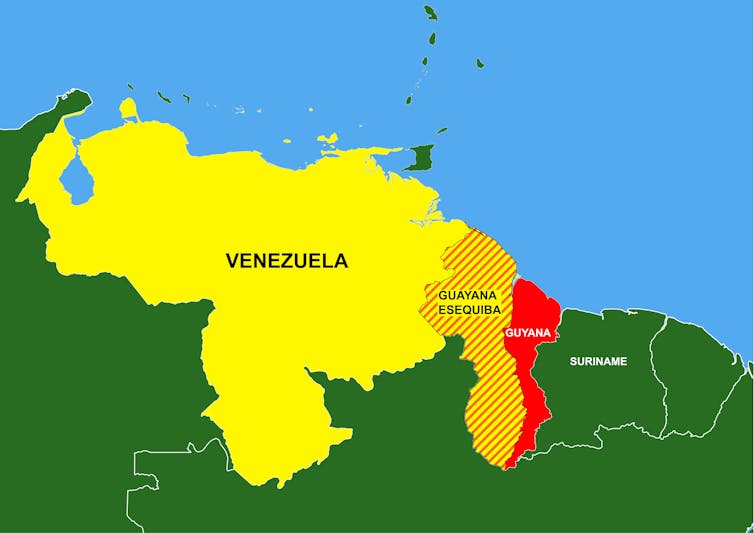Irfaan Ali, the leader of the People’s Progressive party (PPP), says he has secured a second term as Guyana’s president. The official results from the election on September 1 are yet to be published, but Ali claims his party has won by a “remarkable margin”.
Vote tallies published by Guyana’s elections commission suggest the PPP has secured more than 240,000 votes, which equates to roughly 55% of the popular vote. The party has also won seven of the country’s ten electoral districts. It appears to have trounced its longtime opponent, A Partnership for National Unity.
Guyanese voters seem to have endorsed Ali’s approach. His campaign was dominated by promises to use oil-related revenue to alleviate chronic poverty and support further social and economic development.
The run-up to the election was tense. Guyana’s elections commission warned voters and parties to behave responsibly when it came to producing and circulating disinformation and fake news.
Guyanese officials pointed to neighbouring Venezuela as the main mischief-maker. This was to be expected. Over the past decade, relations between Caracas and Georgetown have been strained.
The Venezuelan president, Nicolás Maduro, who has long been criticised by his US counterpart Donald Trump, is an outspoken proponent of trying to regain lost territory. Under his dictatorial rule, Venezuela has been pursuing its claim to Guyana’s Essequibo region.
Venezuela’s unhappiness stems from an 1899 international arbitration ruling in Paris that settled the border between Venezuela and what was then British Guiana. Successive Venezuelan governments and dictatorial regimes have disputed the positioning of that international boundary.
If Venezuela is successful, Guyana would be reduced by two-thirds such is the scale of this territorial claim. The International Court of Justice (ICJ) is involved in this matter. It warned Venezuela in 2023 to refrain from taking any actions that “modify that situation that currently prevails” in Essequibo.
Venezuela, which does not recognise the jurisdiction of the ICJ, held a national referendum on the dispute. Voters overwhelmingly supported the establishment of a new Venezuelan province called Guyana Esequiba.
The following year, Venezuela passed a law prohibiting maps of the country without Essequibo. And the ICJ has since reaffirmed its ban on Venezuela holding any “elections” in Guyanese territory.

The discovery of oil on the Guyanese side of the border a decade ago made all the above worse. Maduro has issued decrees and statements disputing Guyana’s right to do exploration deals with oil corporations such as Exxon-Mobil, Chevron and the China National Offshore Company.
Yet Guyana has continued to develop its oil industry. In August 2025, it declared that 900,000 barrels of oil were now being harvested from its oil fields each day. One million barrels will surely be hit sometime soon.
Maduro is determined to be as disruptive as possible, hoping that by generating border-related tension with Guyana international companies will be deterred from continuing their operations onshore and offshore.
He has deliberately sought to mobilise domestic opinion around this issue and has mobilised the Venezuelan military to carry out training exercises, incursions and confront Guyanese border forces.
In March 2025, a Venezuelan coastguard vessel entered Guyana’s waters and sailed close to a floating production storage and offloading platform owned and operated by Exxon-Mobil. The Venezuelan vessel transmitted a radio message claiming it was operating in “disputed international waters”.
Ali’s electoral victory does not alter the fact that his country remains under threat from Venezuela.
US interests
While Venezuela is harassing a smaller neighbour to the east of the country, there are significant developments taking place to the north of Caracas. The Trump administration has deployed a naval task force in the southern Caribbean composed of eight vessels and around 4,000 sailors and marines.
The focus is very much on Maduro’s actions and interests, with the US convinced that the Venezuelan leader is aiding and abetting drug cartels and enabling the operation of narco-terrorism. Trump issued an executive order in January designating cartels such as Tren de Aragua, an organisation from Venezuela, as foreign terrorist groups.
While Maduro complains that the US is preparing to invade Venezuela, the naval task force has been intercepting suspect vessels and maintaining a high-profile presence in southern Caribbean waters.
It recently carried out a strike on a boat that allegedly departed from Venezuela carrying drugs bound for the US. The White House says the strike killed 11 drug traffickers. Venezuela alleged the images of the assault were AI-generated.
There are plenty of reasons why a US task force might be operating in the southern Caribbean. Among these are the fact that the US has commercial interests in Guyana, so is keen to deter hostile action from Venezuela. The US is the top destination for Guyanese oil, and there are also plans to encourage US firms to get involved in digital and fintech projects in Guyana.
Washington is the most important element in Guyana’s future security. Secretary of state, Marco Rubio, visited the country in March 2025 as part of a short regional tour. The worry for Ali is that Guyana acts merely as a strategic platform from which the US can exert further geopolitical pressure on Venezuela.
However, Trump’s focus on energy security and the enhancement of commercial advantages for US companies means that the appeal of Guyana is not hard to discern. President Ali’s second term is not going to be straightforward.
Klaus Dodds does not work for, consult, own shares in or receive funding from any company or organisation that would benefit from this article, and has disclosed no relevant affiliations beyond their academic appointment.
This article was originally published on The Conversation. Read the original article.







